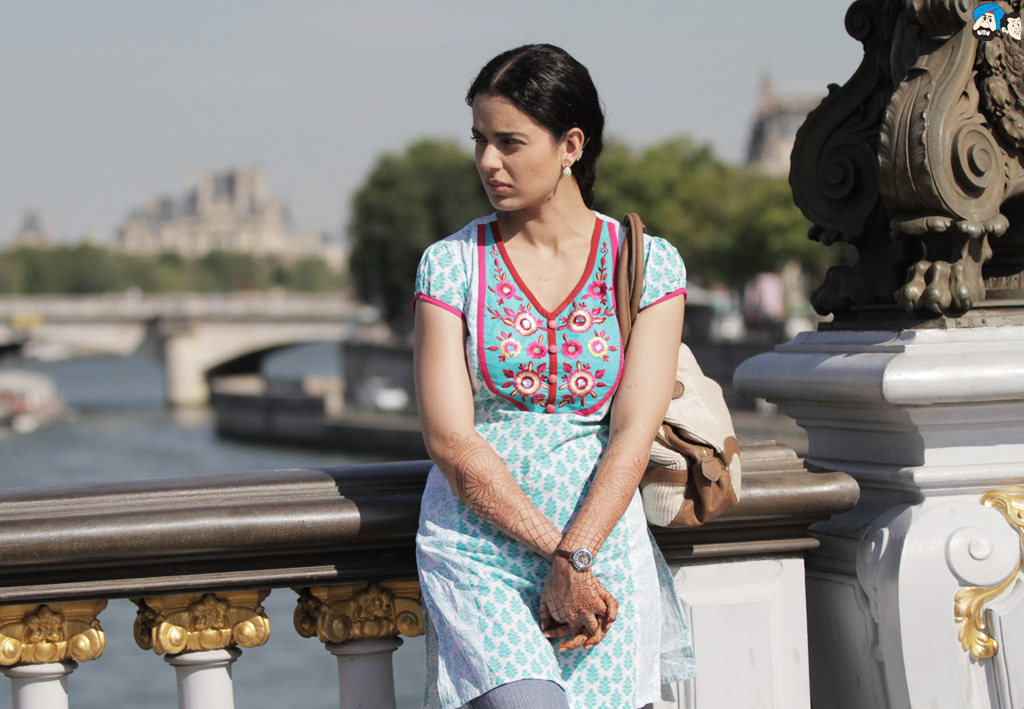What happens when your fiancé leaves you a day before your wedding and you have nowhere to go? Well, you must watch “Queen” if you wish to seek an answer! “Queen,” directed by Vikas Bahl, is an exploration of a simple Indian girl, Rani, played by Kangana Ranaut. In its very opening scene, we listen to the unfiltered internal chatter of excited bride-to-be Rani, even as a quartet of elderly grannies rehearse their steps to a popular dance number while wedding preparations continue around them. Rani and her simple mithaiwala family are deliriously happy during the Mehndi (henna) ceremony, yet even before her henna can darken, the arrogant groom calls off the wedding. Her groom is Vijay, who has returned from London and feels that Rani being simple and very desi doesn’t match his standards anymore!
Director Bahl has captured her grief and pain in such a short amount of time, from a coffee shop to her room; the scene withholds the entire journey of Rani and how her fiancé had treated her while promising her of dreams of castles on clouds which got destroyed over a coffee! The film does not stay in a gloomy mood for long and in a flash, Rani decides to continue with her honeymoon for which she had spent all her savings.
Soon, we can see Rani in Paris, and she is exploring all the tourist sites while video calling her family who are concerned for her. Further, she meets Vijayalakshmi, played by the stunning Lisa Haydon, who uncovers a layer of Rani by taking her out to pubs and touristy places. These scenes with Lisa Haydon represent breaking a chain of repression which makes Rani realise her existence has been dictated by everyone else in her life…her father, her mother, and then her fiancé. The scene where she dances freely is an awakening of Rani.

She later moves to Amsterdam where she meets three men from France, Japan, and Russia with whom she bunks in a hostel. This is a big step for her, because, all her life she has been taught to stay away from men as if they represent the danger. This is another layer of her becoming and she learns a lot about the opposite gender.
The hiccups in the film are that it’s often predictable and sometimes trite, especially when you learn that Rani’s new Japanese friend Taka lost his parents in the tsunami which makes her respect her family more, or when a Pakistani stripper in Amsterdam reveals that she has taken up the profession to help her Ammi and her siblings. Even a cooking challenge involving a Gol Gappa stall at a Dutch promenade comes off as contrived. Yet these are passing clouds in this sunshine film. You burst out laughing as Rani innocently buys souvenirs at a sex shop, or when she narrates Santa-Banta “dirty” jokes to foreigners. Amit Trivedi’s music lends a joyful third dimension to this narrative, but the sparkling humour comes from the dialogues, which leading lady Kangana is herself credited with co-writing. When she returns back to India, she is no longer the Rani she had left behind.
“Queen” provides a fresh perspective in an Indian woman’s life, and the casting of the movie makes it even stronger. In the end, Rani becomes her true self and finds the purpose of her existence which is independent of any husband, any man, or anyone. Movies which inspire women to break the shackles of patriarchy are much needed in this world today!